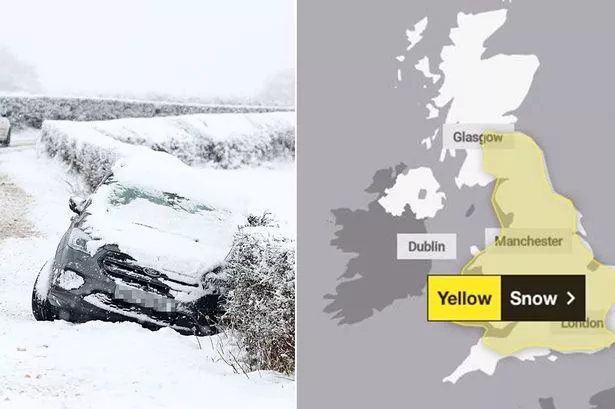The United Kingdom braces for a weekend gripped by wintry weather, with widespread warnings for snow and ice issued across the country. The Midlands and Wales are anticipated to bear the brunt of the icy blast, as forecasters predict a significant drop in temperatures, potentially leading to hazardous travel conditions and disruptions to daily life. While the entire country is under some level of alert, these regions are singled out for the highest risk of heavy snowfall and persistent ice, posing challenges for motorists, pedestrians, and public services. Residents are urged to exercise caution, avoid unnecessary travel, and prepare for potential power outages and other weather-related disruptions.
The impending cold snap follows a period of relatively mild weather for the season, increasing the likelihood of treacherous black ice forming on untreated surfaces. This invisible threat presents an especially dangerous hazard for drivers and pedestrians alike. Authorities are advising residents to check weather forecasts regularly, remain vigilant for changing conditions, and take necessary precautions, such as wearing appropriate footwear and using public transport where possible. Gritting lorries will be deployed across affected areas in an attempt to mitigate the risk, but travellers are still advised to allow extra time for journeys and to be prepared for potential delays and cancellations. The combination of snow and ice is expected to create challenging driving conditions, particularly on untreated roads and higher ground.
Mountainous regions are particularly susceptible to heavy snowfall accumulations, potentially leading to road closures and impacting access to remote communities. Emergency services are on standby to respond to any weather-related incidents and are urging people to heed safety advice. Hill walkers and climbers are advised to postpone their activities until conditions improve, as the risk of becoming stranded or injured is significantly heightened during severe weather events. The prolonged cold temperatures also pose a risk to vulnerable individuals, including the elderly and those with underlying health conditions. Community support networks are encouraged to check on vulnerable neighbours and ensure they have access to essential supplies and adequate heating.
The expected snowfall will likely disrupt essential services, potentially leading to school closures, power outages, and disruptions to public transport networks. Train and bus services are particularly vulnerable to weather-related delays and cancellations, and passengers are advised to check service status before travelling. Schools and other educational institutions may be forced to close if conditions become too treacherous, impacting childcare arrangements for many families. Power companies are preparing for potential outages caused by heavy snow and ice accumulating on power lines, and are urging customers to report any outages immediately and to have emergency supplies on hand.
The disruptive impact of this wintry weather extends beyond transport and essential services, potentially affecting businesses and economic activity. Retailers and hospitality venues may experience a downturn in trade as people choose to stay home, while construction and other outdoor industries may be forced to halt operations due to hazardous conditions. Farmers and agricultural businesses face particular challenges, with livestock needing extra care and crops potentially suffering damage from frost and snow. The anticipated economic impact underscores the importance of preparedness and the need for effective contingency plans to minimize disruption.
While the immediate focus is on managing the risks posed by this weekend’s weather event, the longer-term implications of these increasingly frequent extreme weather events highlight the need for climate change adaptation and mitigation strategies. The UK, like many other countries, is experiencing a changing climate, with warmer winters punctuated by periods of intense cold and increased frequency of extreme weather events. Investing in infrastructure resilience, developing early warning systems, and promoting community preparedness are crucial steps in managing the risks associated with these changing weather patterns and ensuring the safety and well-being of communities across the country. This weekend’s weather event serves as a timely reminder of the importance of being prepared and adapting to the challenges of a changing climate.














